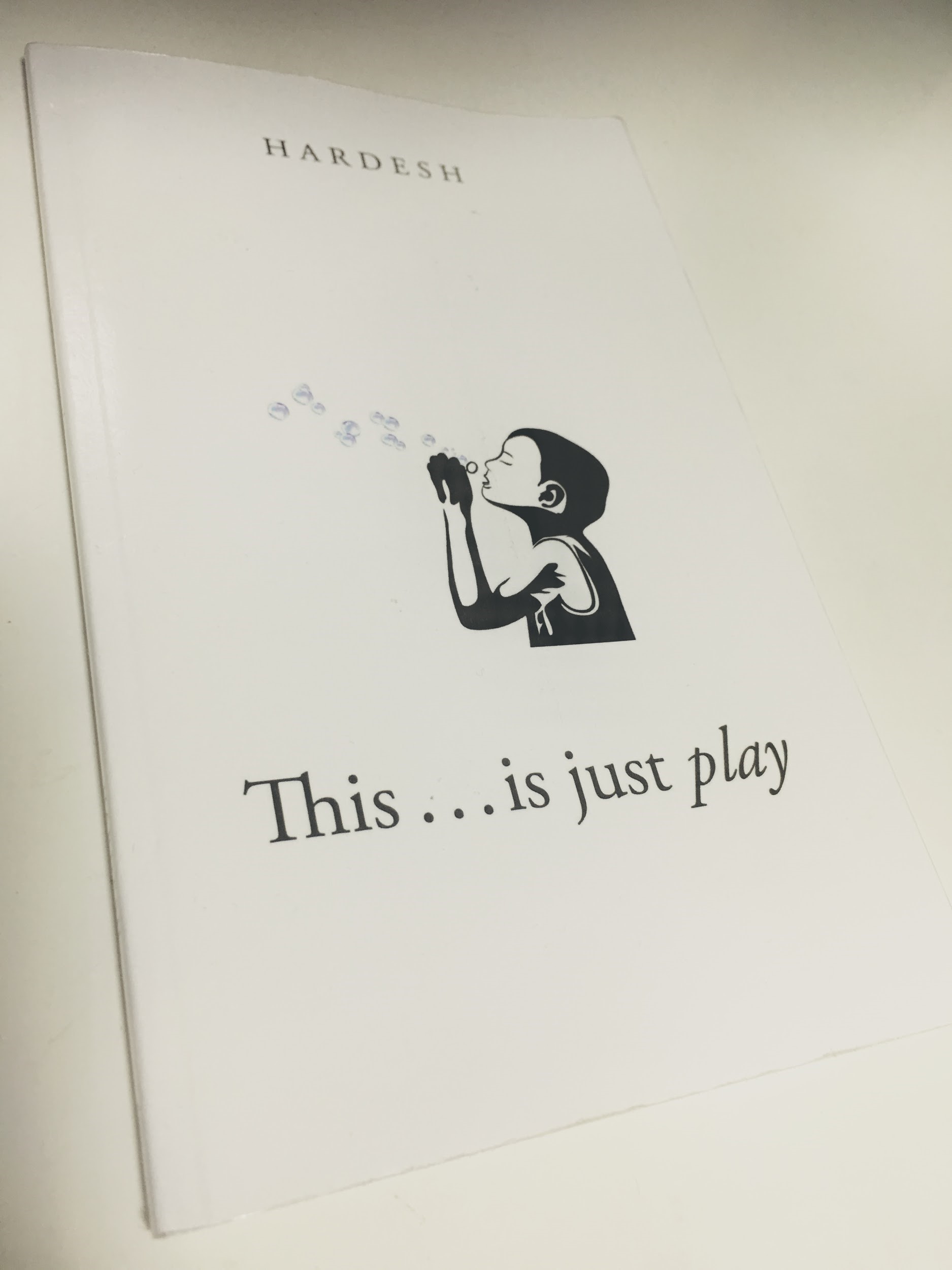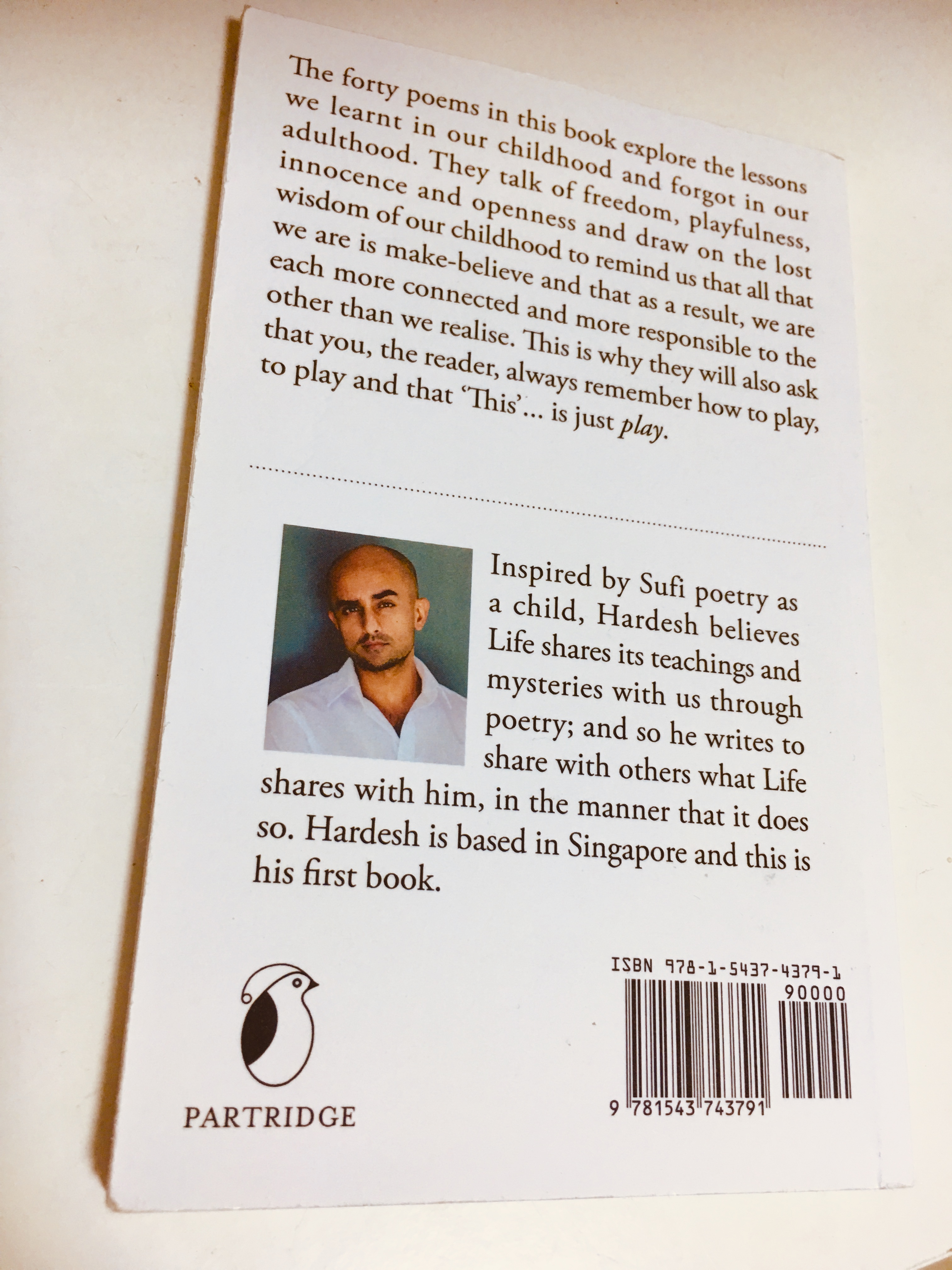Our community sure is bursting with talent, with another poetry publication, this time by Hardesh Singh!
With 40 poems in his first poetry publication, Hardesh shares life lessons and the lost wisdom from our childhood that remind us to stay connected as we journey through adulthood and the challenges that come with it.

We had the chance to ask him some questions about his passion and are excited to share his story with our readers.
How did your interest in poetry begin?
My interest in poetry was first piqued when, as a child, I came across a series of poems by Rumi. The different worlds that he created with his poetry and the ideas, emotions and wisdom took my heart away. Sufi poetry has a certain spirit of innocence and bare honesty about life, what we are and how we are. I began writing soon after, inspired as I was by my love for his poetry. What I learnt soon after was that the beauty of poetry is in the way that it suggests but does not tell you what to think; you get to take from it what you will each and every single time you return to it.
Do you have any favourite poets or poems by others?
Yes, a few of my favourites include Pablo Neruda, Omar Khayyam, Jami and of course Rumi. I have to also mention my favourite author: Orhan Pamuk, who writes captivating novels.
Do you practice writing poetry often or do the poems come to you naturally?
Honestly, it’s a little bit of both. You have to practice constantly if you hope to write anything worthwhile, although this is easier said than done. Inspiration, for better or worse, is a muscle that needs to be trained; and a large part of writing involves learning to listen and to observe, and to be taken by the world around you.
Do you worry about the “rules” of poetry while writing your own?
I try to but I think my desire to be authentic with whatever it is I seek to express is what guides me. I always know when I have written something good and worthwhile because it feels true to whatever it is I hope to express.
Do we need to be fantastic at English to write poetry?
I don’t think anyone is really fantastic in English or any language for that matter and that’s not really the point: it’s not so much about adhering to rules and structure as it is about conveying an emotion or idea authentically.
What motivated you to publish?
I did it mostly as a desire to want to share my work with others. It was also important to create something of my own that I could put out there and share with the world. Of course, you are always conscious about how your work will be received and what people might think of it – but when it comes to art, there is no one correct interpretation and you have to be open and willing to let your work be taken by the world as it is and in the way that people choose to – which is a lot like how we should embrace our relationship with the world around us.

You dedicated the book to your mother and brother. How did they influence you so strongly for you to dedicate your first book to them?
A large part of who and what we are in life is a result of our relationships with our loved ones. I obviously owe everything in this life to my mother; and as for my brother, the themes of innocence and childlike wonder at the world and life reflect our relationship as brothers, the common aspects of our personalities and the manner in which we were raised by our mother.
Why do you think play is so important and how can it serve us in our adult lives?
We tend to get caught up in the business of life and oftentimes we become cynical and jaded. So it was an exercise in introspection for me to examine and contrast the way I view life today and how I did so as a child. In this book, I have tried to reflect the need to not get so caught up with life, or with the need to grow up and carve a narrow interpretation of our experience here. A child sees wonder and possibilities in everything and everyone and we can retrieve that innocence and curiosity for ourselves if we simply learn to just play as we once did.
Were the poems arranged in a chronological order of when you wrote them or in a thematic fashion? How did you structure the poems in this collection?
I tried but soon gave up all attempts at presenting my poems in any coherent structure. Instead, I wanted readers to find each poem ‘fresh’, separate and distinct from the ideas and emotions that were evoked in the ones that preceded it.
Many poems revolve around the material and other forms of attachments we have to things, feelings and thoughts. Was there a particular turning point for you to let these go?
I’m not sure we ever truly let go of our experiences in life. Instead, it’s less about letting go and more about accepting that these events and experiences have shaped us in some way and brought us to where we are today. Our very identities are shaped by our relationships with people, places, objects, ideas and emotions. These relationships are stories that will go on to shape the large one that we continue to tell with each passing day of our lives.
Poem 10 has a really strong message in such succinct form. Was the inspiration for this poem from a specific event you encountered?
In this poem, I was actually making a reference to myself. I was part of a charity initiative in Sri Lanka and while at a school to donate books and other items, I found myself surrounded by a whole bunch of ecstatic children, wide-eyed and curious about these strangers before them. They wanted to reach out and make friends and to simply indulge in innocent games as kids do. The fact that I found myself so hesitant, unsure and trapped as it were, unable and unsure of how to reciprocate, of how to play simple games, and laugh for no real reason made me question myself. What does it say of me as a person if I found it so difficult to simply reach out and share in laughter and play with children? And I couldn’t help but wonder how many of us have experienced something similar in our lives with our own families, friends and strangers.
Can we look forward to more poetry books?
Yes, although I am presently working on my first novel – so stay tuned!
What kind of feedback have you received so far?
I’m very grateful that people responded the way they did to it despite me making very little effort to market or publicize it. It’s encouraging to see that people took from it what I had hoped they would.
What advice would you give to others who have yet to try writing poems?
Just start! There’s no right way to begin and you’re never ever going to be ready enough. You might just surprise yourself and it will always be a work in progress even if you end up as a best-selling author someday.
What advice would you have to those who are afraid of publishing their work?
Start right now – there’s never a better time. Aim to create a gift for the world around you by sharing a little of your life and experiences. That is always enough.
To purchase “This…is just play” by Hardesh Singh, visit Amazon.com.